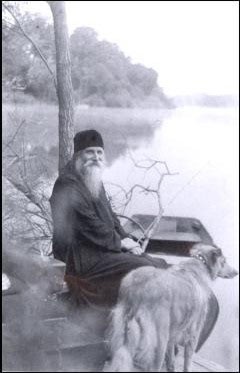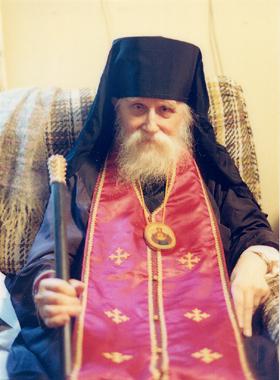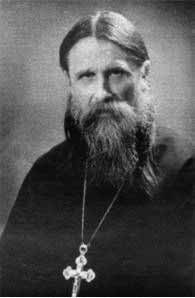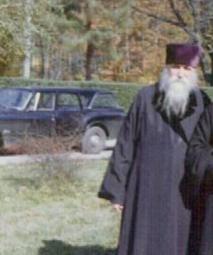Filed under 3 Articles & Sermons, English
Tags: Sermon
5th Sunday after Pentecost – the Two Demoniacs
Homily From “The One Thing Needful,” Sermons of Archbishop Andrei (Rymarenko)

The Gospel reading for last Sunday taught us a lesson on the deep humility of the Roman Centurion, who came to ask Christ for the healing of his servant. But today’s Gospel does not give us a lesson of what we should do, but rather shows us what we should avoid, what we should not do. This shows us the striking reality of the existence of the power of evil. In our time such a reality doesn’t even require proof. Every day, every newspaper tells about a whole list of crimes which simply cannot be explained without recognizing that the person is possessed by an external, evil power.
Today’s Gospel draws a terrible picture for us: two demoniacs came out from the tombs, “exceeding fierce, so that no man might pass by that way” (Mt. 8:28). Christ permitted the de-mons to enter into a huge herd of swine. The possessed ones were healed, but the whole herd of swine jumped from the precipice into the sea. What a terrible force! A real, overt force of evil! (more…)
Filed under 3 Articles & Sermons, English
Tags: Sermon
4th Sunday after Pentecost – the Roman Centurion
Homily From “The One Thing Needful,” Sermons of Archbishop Andrei (Rymarenko)

“Seek ye first the Kingdom of God and His righteousness” (Mt. 6:33). This is what last Sunday’s Gospel left with us.
On the day of Pentecost the Lord sent down upon His Church the Holy Spirit. Just as all of nature which, after it had been warmed up by the sun, began to grow flowers, plants, and fruits — so the Holy Church, upon receiving the Holy Spirit, the Giver of Life, began to grow spiritual flowers — her wonderful Saints.
All the Gospel readings since the coming down of the Holy Spirit have been telling us what we must do to obtain the Kingdom of Heaven; what all the Saints did, how they sought and how they found “the Kingdom of God and His righteousness.” We were given the command-ments of the Lord. But today we are not given commandments, or a teaching. No, but rather life itself, a living example. And as an example for us, the Gospel reading gives us a Roman centu-rion, a pagan. This is an example of the most profound humility. This example shows us how a master, out of love for his neighbor, becomes a slave. After all, according to his civic position, this Centurion was master not only over the hundred soldiers which he commanded, but also over all Jews, which meant even over Christ; because the Jews were enslaved by the Romans. (more…)
Filed under 3 Articles & Sermons, English
Tags: Sermon
3rd Sunday after Pentecost
Homily From “The One Thing Needful,” Sermons of Archbishop Andrei (Rymarenko)
 “Seek ye first the Kingdom of God, and his righteousness; and all these things shall be added unto you” (Mt.6:33).
“Seek ye first the Kingdom of God, and his righteousness; and all these things shall be added unto you” (Mt.6:33).
Everything necessary for our earthly existence will be added: food, drink, clothing. But not just added; there is one condition: “Seek ye first the Kingdom of God.”
What does “seek” mean? It means that the Lord requires from us actions, an effort of our will. Remember the Gospel readings for the last two weeks (‘The Week of All the Saints” and “The Week of All Saints Who Shone in Russia”) and also what was said in today’s Gospel. These are like steps by which all the saints ascended to the heavenly dwellings, and by which we too must all ascend. Indeed, there is no other way. The way to the Lord is the same for everyone. And it is this: Confess Christ before people, love Him more than everyone and everything else, and take up our cross and follow Him, in the same way the Apostles followed Him, leaving everything behind: their families, nets and boats. And not care about what we eat or drink or about what to wear, because our Heavenly Father knows that we need all these things. The Gospel gives us wonderful examples: “Behold the fowls of the air: for they sow not, neither do they reap … yet your Heavenly Father feedeth them…. And why take ye thought for raiment? Consider the lilies of the field, how they grow; they toil not, neither do they spin: and yet I say unto you, That even Solomon in all his glory was not arrayed like one of these” (Mt. 6:26, 28-29). (more…)
Filed under 3 Articles & Sermons, English
Tags: Sermon
2nd Sunday after Pentecost – All Saints of Russia
Homily From “The One Thing Needful,” Sermons of Archbishop Andrei (Rymarenko)
 Brothers and sisters, today the Holy Church opens before us our native heaven — all the Saints who shone in Russia. They shine as bright stars before us. And the first among them is St. Vladimir. He was a gifted military leader, statesman, a man of penetrating mind and strong will. The political situation among the Russian Slavs required just such a man. Many Slavic tribes were living at that time on the shores of the Dnieper River, and all of them had already been influenced by the Christian message — the dawn of a new life was approaching. Only our forefathers remained pagans. But by that time they too had lost faith in the pagan gods and actually had no religion at all. And the thirst for the One, True, Almighty God more and more strongly took possession of their souls. Vladimir himself was experiencing the same thing: his great soul was tired of the lie and, as a bird from its cage, was straining towards Truth, towards Light.
Brothers and sisters, today the Holy Church opens before us our native heaven — all the Saints who shone in Russia. They shine as bright stars before us. And the first among them is St. Vladimir. He was a gifted military leader, statesman, a man of penetrating mind and strong will. The political situation among the Russian Slavs required just such a man. Many Slavic tribes were living at that time on the shores of the Dnieper River, and all of them had already been influenced by the Christian message — the dawn of a new life was approaching. Only our forefathers remained pagans. But by that time they too had lost faith in the pagan gods and actually had no religion at all. And the thirst for the One, True, Almighty God more and more strongly took possession of their souls. Vladimir himself was experiencing the same thing: his great soul was tired of the lie and, as a bird from its cage, was straining towards Truth, towards Light.
The same was required in the political situation as well; enlightenment and culture were in Christianity. Paganism was dying out and Christianity was becoming the new, all-powerful movement in contemporary culture and life. The acceptance of Christianity became a necessity, something which could not be put off if the Russian nation wanted to keep in step with other nations. (more…)
Filed under 3 Articles & Sermons, English
Tags: Sermon
1st Sunday after Pentecost – Sunday of All Saints
Homily From “The One Thing Needful,” Sermons of Archbishop Andrei (Rymarenko)
 Brothers and sisters! Last week the Holy Church placed flowers in our hands, as if saying to us: See how soulless nature is obedient to its Creator. Starting with the days of Christmas, the earth has been turning toward the sun, which began to bestow upon the earth its life-giving warmth. And nature does not prove itself ungrateful toward its Creator. In answer to His caress, she has produced this glorious beauty, these flowers, and further on, will produce fruits. And what about us? In answer to the spiritual warmth of God’s Grace, so abundantly poured out on us, do we bring to our Creator spiritual beauty, flowers, fruits of virtues? After all, He became Man for our sake, died for us, rose for us, ascended into Heaven in order to send down to us His Holy Spirit. And what about us? Is not this beauty of nature around us a reproach to our conscience? Let us answer honestly. Yes, it is. But more than this, we want to justify our negligence, our ingratitude. The commandments of Christ are wonderful, we say; and if people would begin to fulfill them, then the whole earth would be transformed into a wonderful divine garden. But is this possible for weak human strength? And here this Sunday, the Sunday of All the Saints, answers this question loudly so that the whole world hears: Yes, it is possible. (more…)
Brothers and sisters! Last week the Holy Church placed flowers in our hands, as if saying to us: See how soulless nature is obedient to its Creator. Starting with the days of Christmas, the earth has been turning toward the sun, which began to bestow upon the earth its life-giving warmth. And nature does not prove itself ungrateful toward its Creator. In answer to His caress, she has produced this glorious beauty, these flowers, and further on, will produce fruits. And what about us? In answer to the spiritual warmth of God’s Grace, so abundantly poured out on us, do we bring to our Creator spiritual beauty, flowers, fruits of virtues? After all, He became Man for our sake, died for us, rose for us, ascended into Heaven in order to send down to us His Holy Spirit. And what about us? Is not this beauty of nature around us a reproach to our conscience? Let us answer honestly. Yes, it is. But more than this, we want to justify our negligence, our ingratitude. The commandments of Christ are wonderful, we say; and if people would begin to fulfill them, then the whole earth would be transformed into a wonderful divine garden. But is this possible for weak human strength? And here this Sunday, the Sunday of All the Saints, answers this question loudly so that the whole world hears: Yes, it is possible. (more…)
Filed under 3 Articles & Sermons, English
Tags: Sermon
Holy Trinity Sunday – Pentecost
Homily From “The One Thing Needful,” Sermons of Archbishop Andrei (Rymarenko)
 Brothers and sisters! See how the Holy Church teaches our conscience. The flowers today represent our conscience. Because when all of nature was still dead, when the time of our yearly cycle was approaching, the Holy Church revealed to us a great mystery: the mystery of our redemption. She then opened before us the cave of Bethlehem and the Lord Who had just been born. And we were told through the reading from the Epistle to the Galatians that this cave is our entrance in to a new yearly cycle, that at the manger of Christ our soul is renewed, and that in this renewal of spirit we receive the spirit of adoption (sonship), which unites us into the one family of Christ (Gal. 4:4-7).
Brothers and sisters! See how the Holy Church teaches our conscience. The flowers today represent our conscience. Because when all of nature was still dead, when the time of our yearly cycle was approaching, the Holy Church revealed to us a great mystery: the mystery of our redemption. She then opened before us the cave of Bethlehem and the Lord Who had just been born. And we were told through the reading from the Epistle to the Galatians that this cave is our entrance in to a new yearly cycle, that at the manger of Christ our soul is renewed, and that in this renewal of spirit we receive the spirit of adoption (sonship), which unites us into the one family of Christ (Gal. 4:4-7).
And these are not just words. The Holy Church convinces us of this, comparing our spiritual life with what goes on in nature: the death of nature in winter, its revival in the beauty of spring and summer, and the yielding of fruit in fall. It is the same with the soul of a human being. After the sluggishness of spiritual slumber, a person receives the spirit of adoption in order to unite in one family and to receive what the Lord gives in His plan of salvation — His Body and Blood, the Mystery of the Tree of Life, which Adam lost in Paradise. (more…)
Filed under 3 Articles & Sermons, English
Tags: Sermon
5th Sunday of Pascha – Sunday of the Samaritan Woman
Homily From “The One Thing Needful,” Sermons of Archbishop Andrei (Rymarenko)
 Today, we Orthodox Christians are still on the Mount of Olives. The after-feast of the Ascension is going on; but these are already the last days. In another two or three days we will have to descend the Mount of Olives. And today, Sunday, a question arises for us Orthodox Christians: to where?
Today, we Orthodox Christians are still on the Mount of Olives. The after-feast of the Ascension is going on; but these are already the last days. In another two or three days we will have to descend the Mount of Olives. And today, Sunday, a question arises for us Orthodox Christians: to where?
As if in answer to this question, the Holy Church at the same time opens the doors for us and says: The Tree of Life of Paradise is already restored the Eucharist, the Body and Blood of Christ. For each of us the doors are open: come and see, take and receive. Here is that great dogma which was revealed by the Lord in the restoration of that great thing which was lost by Adam – the Tree of Life. “Whoso eateth My Flesh, and drinketh My Blood hath eternal life; and I will raise him up at the last day” (Jn. 6:54). He who eats the Flesh and drinks the Blood of Christ has life eternal, but…
Here the Holy Church defines this “but” for us. What is this “but”? The doors are open. The Eucharist is prepared. The Holy Church is prepared to receive each of us in the Divine Lit-urgy. But for this, it is necessary for us to be prepared. What does this “preparation” consist of? This day, the day we call the Sunday of the Holy Fathers, gives us the answer. Here begins the establishment of rules which a Christian must follow in order to receive the New Testament Tree of Life the Body and Blood of Christ which will give life to man. (more…)
Filed under 3 Articles & Sermons, English
Tags: Sermon
The Ascension of the Lord
Homily From “The One Thing Needful,” Sermons of Archbishop Andrei (Rymarenko)
 “While He blessed them, He was parted from them, and carried up into heaven. And they worshipped Him and returned to Jerusalem with great joy”…with great joy … “and were continually in the temple, praising and blessing God” (Lk. 24:51-3).
“While He blessed them, He was parted from them, and carried up into heaven. And they worshipped Him and returned to Jerusalem with great joy”…with great joy … “and were continually in the temple, praising and blessing God” (Lk. 24:51-3).
If, during the course of six weeks, the Holy Church has been teaching us to preserve this peace which Christ granted on the first day of His Resurrection, saying: “Peace be unto you” (Jn. 20:19), then now this feeling of peace should fill our hearts. You see, this feeling of peace appears in all of us as an expectation of joy. People search for some kind of rest, some kind of com-fort. For this they travel from place to place in order to find peace. And yet this peace is within them, only in an unrevealed state. Peace is that gift which the Lord gave to us, that peace which keeps a person in a kind of unearthly state of joy. This is what the Holy Church has been teach-ing us during the six weeks of Easter: to be close to Christ, to preserve this peace, protect our-selves from those things which, entering our heart, might disturb this peace. (more…)
Filed under 3 Articles & Sermons, English, Photos / Фото
Tags: Sermon
6th Sunday of Pascha – Sunday of the Blind Man
Homily From “The One Thing Needful,” Sermons of Archbishop Andrei (Rymarenko)
 Last Sunday, the Sunday of the Samaritan woman, the Holy Church told us how Christ raises a person from an earthly, carnal state of mind to the state in which a human being thirsts to worship God and pray to Him. You see, the Samaritan woman came to the well for physical water which satisfies only earthly thirst. But when Christ revealed her sins to her, and she ran to Him in repentance, then in her awakened spiritual thirst, the thirst for Living Water springing up into everlasting life, the thirst for communion with God, her first question was about prayer: where one should worship God, how to pray. Now today’s Gospel gives us a model for prayer. (more…)
Last Sunday, the Sunday of the Samaritan woman, the Holy Church told us how Christ raises a person from an earthly, carnal state of mind to the state in which a human being thirsts to worship God and pray to Him. You see, the Samaritan woman came to the well for physical water which satisfies only earthly thirst. But when Christ revealed her sins to her, and she ran to Him in repentance, then in her awakened spiritual thirst, the thirst for Living Water springing up into everlasting life, the thirst for communion with God, her first question was about prayer: where one should worship God, how to pray. Now today’s Gospel gives us a model for prayer. (more…)
Filed under 3 Articles & Sermons, English, Photos / Фото
Tags: Sermon
5th Sunday of Pascha – Sunday of the Samaritan Woman
Homily From “The One Thing Needful,” Sermons of Archbishop Andrei (Rymarenko)
 “Jesus therefore, being wearied with His journey, sat thus on the well: and it was about the sixth hour. There cometh a woman of Samaria to draw water: Jesus saith unto her, Give me to drink” (Jn. 4:6-7). The Samaritan woman became filled with confusion and doubt of a purely worldly nature: How could He, a Jew, ask to drink from her, a Samaritan? The Jews had no dealings with the Samaritans. And even more, He said that if she knew Who He was, then she herself would ask drink from Him, and He would give her Living Water. How could He give her something to drink? Why, He didn’t even have anything to draw water with, and the well was deep. (more…)
“Jesus therefore, being wearied with His journey, sat thus on the well: and it was about the sixth hour. There cometh a woman of Samaria to draw water: Jesus saith unto her, Give me to drink” (Jn. 4:6-7). The Samaritan woman became filled with confusion and doubt of a purely worldly nature: How could He, a Jew, ask to drink from her, a Samaritan? The Jews had no dealings with the Samaritans. And even more, He said that if she knew Who He was, then she herself would ask drink from Him, and He would give her Living Water. How could He give her something to drink? Why, He didn’t even have anything to draw water with, and the well was deep. (more…)


 Sts Cyril and Methodius Orthodox Institute
Sts Cyril and Methodius Orthodox Institute

 Brothers and sisters, today the Holy Church opens before us our native heaven — all the Saints who shone in Russia. They shine as bright stars before us. And the first among them is St. Vladimir. He was a gifted military leader, statesman, a man of penetrating mind and strong will. The political situation among the Russian Slavs required just such a man. Many Slavic tribes were living at that time on the shores of the Dnieper River, and all of them had already been influenced by the Christian message — the dawn of a new life was approaching. Only our forefathers remained pagans. But by that time they too had lost faith in the pagan gods and actually had no religion at all. And the thirst for the One, True, Almighty God more and more strongly took possession of their souls. Vladimir himself was experiencing the same thing: his great soul was tired of the lie and, as a bird from its cage, was straining towards Truth, towards Light.
Brothers and sisters, today the Holy Church opens before us our native heaven — all the Saints who shone in Russia. They shine as bright stars before us. And the first among them is St. Vladimir. He was a gifted military leader, statesman, a man of penetrating mind and strong will. The political situation among the Russian Slavs required just such a man. Many Slavic tribes were living at that time on the shores of the Dnieper River, and all of them had already been influenced by the Christian message — the dawn of a new life was approaching. Only our forefathers remained pagans. But by that time they too had lost faith in the pagan gods and actually had no religion at all. And the thirst for the One, True, Almighty God more and more strongly took possession of their souls. Vladimir himself was experiencing the same thing: his great soul was tired of the lie and, as a bird from its cage, was straining towards Truth, towards Light. Last Sunday, the Sunday of the Samaritan woman, the Holy Church told us how Christ raises a person from an earthly, carnal state of mind to the state in which a human being thirsts to worship God and pray to Him. You see, the Samaritan woman came to the well for physical water which satisfies only earthly thirst. But when Christ revealed her sins to her, and she ran to Him in repentance, then in her awakened spiritual thirst, the thirst for Living Water springing up into everlasting life, the thirst for communion with God, her first question was about prayer: where one should worship God, how to pray. Now today’s Gospel gives us a model for prayer.
Last Sunday, the Sunday of the Samaritan woman, the Holy Church told us how Christ raises a person from an earthly, carnal state of mind to the state in which a human being thirsts to worship God and pray to Him. You see, the Samaritan woman came to the well for physical water which satisfies only earthly thirst. But when Christ revealed her sins to her, and she ran to Him in repentance, then in her awakened spiritual thirst, the thirst for Living Water springing up into everlasting life, the thirst for communion with God, her first question was about prayer: where one should worship God, how to pray. Now today’s Gospel gives us a model for prayer.